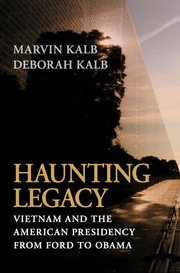Q&A with writer Lynn Kanter
 Sunday, February 21, 2016 at 8:09AM
Sunday, February 21, 2016 at 8:09AM  Lynn Kanter is the author of the novel Her Own Vietnam. She also has written the novels On Lill Street and The Mayor of Heaven. She is a writer for the Center for Community Change, and she lives in Washington, D.C.
Lynn Kanter is the author of the novel Her Own Vietnam. She also has written the novels On Lill Street and The Mayor of Heaven. She is a writer for the Center for Community Change, and she lives in Washington, D.C.
Q: You've said that your own youth was shaped by the Vietnam War. What impact did it have on you, and how did that affect your decision to write this book?
A: When I was a teenager, the Vietnam War was everywhere: on TV, in the newspaper, the subject of heated discussions at home and at school. The anti-war movement too was all around me, in the streets, on the news, even reflected in the clothing people my age wore and the music we listened to. I was only a dabbler in anti-war sentiment, but two things happened in 1970 when I was 16 that profoundly shook me.
One was that my older brother turned 18. Draft age. His fate would be decided by a man who reached into a large transparent canister and pulled out a blue plastic capsule about the size of a ping-pong ball. In the capsule was a date, and that date would determine the order in which boys would get drafted, based on their birth date. It was a lottery straight out of Shirley Jackson. My brother got lucky; other boys didn’t.
The second pivotal experience took place in May of 1970, when members of the Ohio National Guard took aim at college students protesting the Vietnam War on their own campus at Kent State University. The Guardsmen fired into the crowd, killing four students and injuring nine others.
As a child, I had struggled with the notion that not long ago, millions of people in Europe had been slaughtered simply because they were like me: Jewish.
Now I had to grapple with the idea that my own government had murdered four kids simply because they were what I hoped to become: politically engaged college students.
I felt a deep sense of alienation from government, from authority, from the older generation, from the way things were. Kent State was the spark that turned me into a lifelong activist.
(Years later I would realize that there had been another yet another layer to this twist of history. Just a few weeks after the Kent State massacre commanded headlines across the country, two students at Jackson State in Mississippi were killed when authorities decided to quell a campus protest by raking a women’s dorm with gunfire. They were African American students at a historically black college, and their deaths drew little notice.)
If I were to draw a line between the influence of the Vietnam War in my life and my decision to write Her Own Vietnam, it would be long and jagged.
In fact, I wouldn’t even say I decided to write the book; it was more that I was thunderstruck by a question. What would it be like to be a woman who had served in Vietnam? A woman who had been inside the experience that overshadowed my youth, and who now carried it inside herself? The only way for me to find the answers would be to write the novel.
Q: How did you come up with your main character, Della, and why did you choose to focus on a woman who served as a nurse in Vietnam?
A: I knew that the majority of the women who served were nurses, so I began to imagine the character who would become Della Brown. How did she end up in Vietnam as a young woman? Did she volunteer, was she running away from something, was she shocked to find herself deployed there?
I thought about what kinds of economic forces or personal choices might motivate a young woman to join the service in those years. Which ideals did she think she was serving?
While I loved doing the research to be able to portray her experiences in Vietnam, I was particularly intrigued by the question of what Della’s life was like now.
If you looked at her you would see an unremarkable middle-aged woman going about her business. You would never guess that Vietnam smoldered inside her. What pressures might shift and build to make the war come alive for her again, after all these years?
Q: What kind of research did you need to do to write the novel?
A: …A few of the books I read included A World of Hurt, by Mary Reynolds Powell, American Daughter Gone to War by Winnie Smith, and A Piece of My Heart by Keith Walker, all of which contain personal reflections by women who had served.
I also read journalistic examinations of the Vietnam War, including Long Time Passing by Myra MacPherson and Winners and Losers by Gloria Emerson, as well as articles and interviews online. I studied photos and videos of the places my characters would have worked and lived in Vietnam.
[After joining a listserv for women Vietnam veterans, I met a group of women.] Many were nurses, some had held other military jobs, and one was a civilian who had served as a librarian on an Army base in Vietnam.
They shared their own memories and helped me pin down the details that can help make a story come alive, like the kinds of junk food they missed while they were in Vietnam. It was important for me to try to get the small things right, so no nurse or Vietnam vet who read the book would feel that their experience had been disrespected.
Q: The book jumps from one period in Della's life to another, and back again. Did you plot out the entire book before you started writing, or did you come up with ideas as you wrote?
A: …I never know where the book is going or how it will end. I start with a situation or a question, and then discover the plot as I write.
I knew that this book would have sections that take place in the present day of the novel, which is 2003 just before the Iraq war begins, and in Della’s war experiences in 1969-1970. But after writing those scenes, I spent a lot of time moving them around and trying to figure out the right sequence and balance.
Q: Do you think there are parallels in Della's experience to the experience of women serving in combat areas today?
A: I do think women serving in the military today will recognize some of Della’s experiences. For instance, only in December 2015 did the Pentagon announce that women can now serve in combat posts, although in reality women had been fulfilling combat roles for years, taking the same risks as the men but without gaining the same recognition and respect.
Della and the other nurses didn’t fight, but they did live and work in a combat zone, in constant peril from bombs and bullets.
Although my book doesn’t focus on this, it does allude to the fact that much of the danger the women faced was from some of the men they served with, who wore the same uniform but saw the women as prey rather than partners. I think that is an outrageous reality for many women serving today.
Q: How was the book's title chosen, and what do you see as the Vietnam War's legacy today?
A: The title Her Own Vietnam has a few layers of meaning for me. One is that each person experiences war alone, although they’re surrounded by others. That’s why you sometimes hear veterans refer to “my war,” even with other vets.
Della carries her war inside herself, rarely attempting to share her experiences with her family and perhaps unable to make them understand even when she does try.
I also think it’s interesting that the word “Vietnam” has come to mean a quagmire, a terrible situation you can’t escape. Of course, the Vietnamese people don’t think of it that way. They call it the American War.
My father, a World War II veteran, once told me, “The difference between your generation and mine is that my generation trusted our government.”
The Vietnam War is one reason why that changed. For the first time in history, regular people could watch the war on TV every night, and anyone could see that our political leaders were lying to us. The shimmer of righteousness that had illuminated the U.S. since WWII began to flicker out.
Certainly the shadow of the Vietnam War continues to shape American foreign policy, as you discuss in your book Haunting Legacy. So many decisions about how we engage with the world, and how we treat our own veterans, are based on what we have learned or failed to learn from Vietnam.
Q: What are you working on now?
A: I’m working on some research for my next novel.
Q: Anything else we should know?
A: Her Own Vietnam is my third novel, but the first where I’ve gotten to interact with book groups that are discussing the book. I’ve found this completely fascinating.
People bring so much of their own perspective and life experience to reading a book that I’ve learned to see my own novel in new ways as a result of readers’ insights.
--Interview with Deborah Kalb. Lynn Kanter will be participating in the Temple Sinai Authors' Roundtable in Washington, D.C., on Feb. 27. This Q&A can also be found on deborahkalbbooks.blogspot.com.


Reader Comments